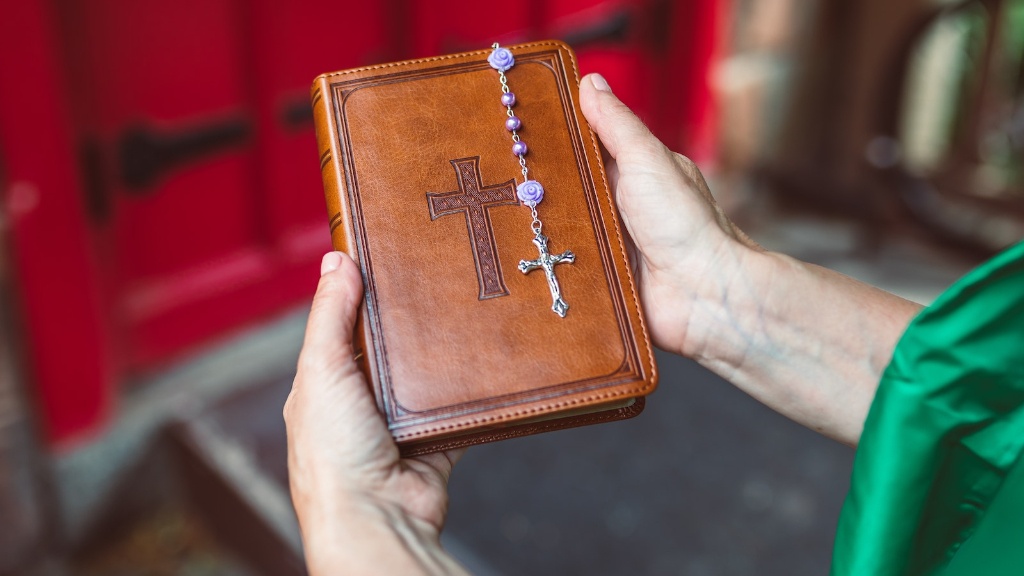According to the Bible, Zion is a place where God’s people can draw near to Him. However, Zion is not just a geographical location, but a metaphor for the presence of God, serving as an encouraging symbol to believers that He is near. Biblical passages in the Old Testament often refer to Zion as a place of peace and of gathering, an indication of its spiritual significance.
Throughout the Bible, Zion often appears to represent a spiritual state of total dedication and commitment to God, something to be striven for. It is depicted as a “high mountain abode” that is a place of joy and blessing and holiness, being a place to which God’s people draw near. Ultimately, Zion symbolizes a place of fellowship with God, an epitome of the reverential wonder felt by believers who are in close proximity with their creator.
The term ‘Zion’ is used to describe both a physical mountain in Jerusalem and is also used as a metaphor for both spiritual status and a particular type of lifestyle. Zion is also often used to refer to the city of Jerusalem, as it served as the physical seat of the power of King David’s kingdom and God’s temple. The biblical city of Zion is described as being “exalted above all the nations”, being set apart as a holy place that unites the physical and spiritual aspects of religion. This can be seen in passages such as Psalm 87:2-3, which states that “The Lord loves the gates of Zion more than all the dwellings of Jacob. Glorious things are spoken of you, O city of God”.
Zion is also used to refer to the Church, having become a metonym for the Christian faith and its believers. In the Gospel of Matthew, Jesus pays tribute to Mizpah, or the city of Zion, as it is often referred to in the Bible. This is seen as a testament to its spiritual significance, as Jesus regarded it as a sacred place of great importance. Indeed, this is further compounded by the New Testament where, for example, the author of Hebrews refers to Zion as a heavenly city.
Furthermore, by using the term ‘Zion’ to describe the Church, believers are being encouraged to emulate God’s holiness and seek His presence. This is illustrated in Biblical passages such as Isaiah 2:2-3 which states “In the last days, the mountain of the Lord’s house shall be established on the top of the mountains, and shall be exalted above the hills; and all nations shall flow to it. Many people shall come and say, ‘Come, and let us go up to the mountain of the Lord, to the house of the God of Jacob. He will teach us His ways, and we shall walk in His paths’”.
Zion As A Source Of Inspiration
The concept of Zion is also a source of inspiration and encouragement to Christians, as seen in the Book of Psalms which contains a recurring theme of prayerful trust and hope in God. To be consecrated as Zion is likened to being lifted up to a place of spiritual elevation and power, such as in Psalm 75:3 which states “The earth and all its inhabitants are dissolved. I bear up the pillars of it”. For this reason, Zion can be seen as a source of divine strength and protection for believers.
In the New Testament, Jesus is referred to as the “King of Zion” and the “Prince of Peace”, with Christianity marking the ultimate redemption of Zion. This serves as a reminder to believers that Jesus’ life and teachings are ultimately a source of inspiration and guidance, teaching that God’s love and power can be found in our time. In the gospel of John, Jesus speaks of the importance of following His words, saying “If you abide in My word, you are My disciples indeed”.
Zion is also seen as an inspiration to believers in their strive for holiness. By drawing near to God, believers can become more like Him, reflecting righteousness and placing themselves in harmony with His will. Scriptures such as the Book of Psalms encourage believers to “look to the mountains; and see: the hills of Zion”, as a reminder of God’s love and His desire for us to be in His presence.
The Impact Of Zion On Christian Practice
The concept of Zion has a great impact on Christian practice, serving as a guide for believers to strive for holiness and to draw closer to God. For example, in the church today Zion is a term for the heavenly city described in Revelation 21, and believers are often reminded that their lives should reflect the holiness of Zion.
One of the most successful Christian ministries in history, the Moravians, based their character on the principles of Zion. This was done to establish a spiritual community of unity and holiness that embodied the spirit of God’s retreat from the world in order to be closer to him. The Moravians created a settlement known as Herrnhut, which served as the physical manifestation of God’s presence on earth.
Pentecostalism, a movement within Christianity, sees Zion as a symbol of spiritual transformation and renewal. During Pentecostal meetings known as azusa meetings, believers would sing songs praising Zion such as “On Zion’s Glorious Peak” and “On Zion’s Mountain, There My Redeemer Will Stand” as an indication of God’s presence and power. Participants of an azusa meeting would come to feel a renewed sense of spiritual vitality, described as “the baptism in the Spirit”, thus symbolizing the movement of God in the affairs of the world and in His people.
Those from the African diaspora often find comfort in the concept of Zion, as indicative of a safe place, both mentally and spiritually. Songs such as “My Soul Is Anchored In The Lord” evoke feelings of support and comfort, whilst also celebrating the power of Zion. Such feelings emphasize the spiritual importance of Zion, showing how for people of the African diaspora, the concept is tied not only to their faith but also to their identity.
Modern Interpretations Of Zion
In recent times, Zion has been seen as a rallying call to respond to social and political issues, whilst also encouraging spiritual growth. For example, during the civil rights movement, Martin Luther King Jr. used sermons and speeches to urge black people to demand justice and equality, citing such references as Isaiah 52:7 “How beautiful upon the mountains are the feet of him who brings good news”.
The concept of Zion has also been used to bring together people from different creeds, particularly those from Islamic and Catholic backgrounds who have become motivated by its universalist and spiritual message. Such occasions are marked by joint worship and study, strengthening the bonds between different spiritual traditions and allowing believers to come together in fellowship.
In contemporary interviews and writings, Zion has also been used to promote principles such as justice and compassion, whilst also highlighting the dire circumstances of people in vulnerable situations. This has been done through such outlets as ‘Zion’s Dwellers’, an online project which aims to share the stories of people in need around the world, thus encouraging compassion, understanding and empathy.
The Connection Between Zion And The Arts
The concept of Zion has also been represented through art, music and literature. For example, the blues musician Blind Willie Johnson wrote a number of spiritual blues songs that touch on the concept of Zion. These include the haunting “Come On Up In The House Of The Lord” and “If I Had The Wings Of An Angel”, hence implying that Zion is a place of joy and peace.
The concept of Zion has also been explored in modern literature, with many iconic authors such as Toni Morrison, Alice Walker and Maya Angelou writing works that richly define and explore its power. For example, Walker’s “The Color Purple” is a celebration of sisterhood and spiritual connection, with the main character Celie journeying to her own personal Zion through her spiritual and emotional awakening.
Modern filmmakers such as Steven Spielberg and Mel Gibson have also been influenced by Zion, with their works often portraying the spiritual power of the concept. For example, ‘The Passion of the Christ’ is a powerful retelling of the life and death of Jesus, which serves as a reminder of his commitment and submission to the will of God and of the importance of personal faith and dedication.
Zion In Popular Culture
In recent years, the concept of Zion has become quite popular within the arts and popular culture. Indeed, Zion is featured in numerous TV shows, comic books, video games and films. Such examples include the cult classic ‘The Matrix’, the video game ‘No Man’s Sky’ and the Marvel superhero character Thor, whose backstory has its roots in Norse mythology.
The concept of Zion has also been embraced as a spiritual theme within music, particularly within genres such as gospel and soul. Notable examples include the soul singer Marvin Gaye, who wrote “A Place Called Zion”, and the 1980s hit “Going To Zion” by the reggae artist Michael Prophet. Such songs highlight how Zion can draw believers to unite in prayer and create an atmosphere of holiness and reverence.
In recent years, Zion has also been adopted by people of various backgrounds, races and creeds as a way to connect with each other and learn about a different faith. This has been done through such means as Open Zion, an online magazine created to challenge stereotypes and foster mutual understanding and respect. This serves as an indication of the power of Zion as a unifying concept, transcending racial and religious divisions and allowing people from different backgrounds to come together in fellowship.
Zion As A Symbol Of Hope And Redemption
The concept of Zion is used throughout the Bible and in popular culture to symbolize hope and redemption. For example, in the Psalms, Zion features as a metaphor for redemption and trust in God, as seen in passages such as Isaiah 12:6 “Shout and be glad, O Zion; for great is the Holy One of Israel in your midst”. This serves as a reminder to believers that God’s love and presence can be felt even in difficult times, and that redemption is possible in Him.
Moreover, the concept of Zion is used in Christianity to bring believers closer to God and to encourage spiritual growth. For example, the Moravians saw Zion as a holy place reflecting the presence of God, whilst Pentecostals viewed it as a place where believers could experience a spiritual transformation. For people from the African diaspora, Zion is often an important source of comfort as a safe place, connecting with their spirituality and identity.
The concept of Zion has a far-reaching impact on both the arts and modern culture. Songs such as Marvin Gay





